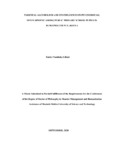| dc.description.abstract | Alcoholism is a global problem that causes many problems including deaths. Many studies have been done on drugs and substance abuse in Kenya. Few studies have singled out alcohol and the harm to family members. The motivation of this study was on the basis of establishing the influence that parental alcoholism has on psychosocial development of public primary school children in Bungoma County with a purpose of improving their welfare. The general objective of this study was to examineParental Alcoholism and its influence on Psychosocial Development of Primary School Pupils in Bungoma County, Kenya. The specific objectives of the study were to; determine the magnitude of alcoholism among parents in Bungoma County, examinethe nexus between parental alcoholism and psychosocial development of primary school pupils, and evaluate strategies to enhance children’spsychosocial development among alcoholic parents of Bungoma County.The study was guided by the Social Learning Theory by Albert Bandura, Erik Erickson’s Theory of Psychosocial Development and Maturational Theoryby Gesell. The study used descriptive survey, correlation and evaluation research designs. Simple random sampling was used to select the sub-counties; purposiverandom sampling was used to select the schools; then stratified simple random sampling to pick pupils from each class in standard seven from the randomly selected schools. The sample comprised 400 pupils, 72 Class Teachers, 72Guidance & Counseling Teachers, 72Senior Teachers, 72 Parent-Teacher Committeemembers, 3 Sub County Administration Officers, 3 Sub County Education Officers, 3Sub County Children Officers and parents. Questionnaires, interview schedules and focusgroup discussions were used to collect primary data. Secondary data was also used. Thedata was analyzed using descriptive statistics that included frequencies, percentages and means; and inferential statistics such as Pearsoncorrelation and chi square. The study found that 55.4% of the parents drank alcohol every day, Pupils gender and parental alcoholism were insignificant with x2= 54.453 at p= 0.675. Further the results show that churches, schools and the local administration are central in strategizing on mitigating the effects of parental alcoholism on psychosocial development of pupils. The study concluded that parental alcoholism has a negativeinfluence on psychosocial development of pupils regardless ofgender.The study recommends that there should be increased Community Educationon the adverse effects of alcohol consumption at individual, family and community levels; Pupils should be taught skills of coping with alcoholic parents and Governments to develop more and better strategies to reduce theavailability of alcohol to children and grownups.Future studies should be carried out in other parts of the country and compare the findings. | en_US |

